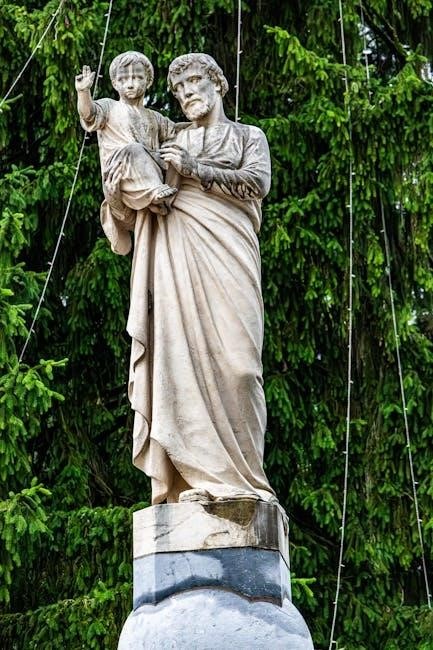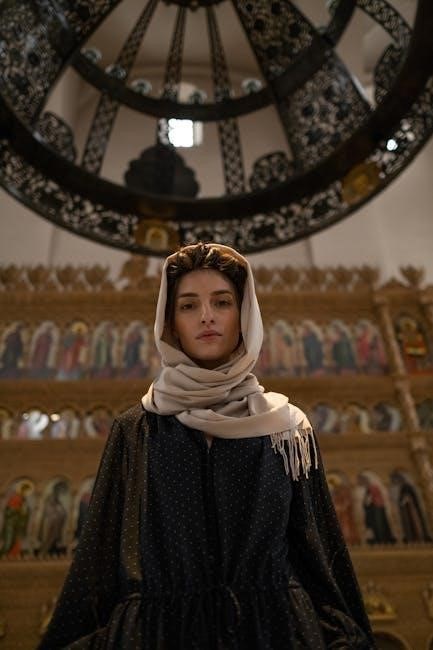Jennifer Saint’s Elektra is a captivating retelling of Greek mythology, focusing on the cursed House of Atreus. The novel explores themes of family dynamics, vengeance, and destiny, offering a fresh perspective on ancient legends through the voices of three women entangled in a cycle of violence and fate. Saint’s vivid storytelling breathes new life into the timeless tale of Elektra, creating a compelling narrative that resonates with contemporary readers.
Background and Context
Elektra by Jennifer Saint is a modern retelling of Greek mythology, focusing on the legendary House of Atreus and its cursed lineage. The novel delves into the intricate web of family dynamics, vengeance, and fate that defines the story of Elektra, a figure deeply rooted in Greek tragedy. Drawing from ancient myths, Saint crafts a narrative that explores the interconnected lives of three women—Clytemnestra, Electra, and Cassandra—each bound by the curse of the House of Atreus. The book is part of Saint’s series reimagining Greek mythology, following her successful debut Ariadne. By blending historical context with contemporary prose, Saint offers a fresh perspective on the timeless themes of family, identity, and the consequences of war, making the ancient story accessible to modern readers while staying true to its mythological roots.
Overview of the Plot
Elektra by Jennifer Saint revolves around the tragic tale of the House of Atreus, focusing on the story of Electra, a princess of Mycenae, and her relentless quest for justice. The novel begins with Clytemnestra’s marriage to Agamemnon, which ignites a chain of events tied to the family’s cursed legacy. Electra’s life is shaped by her father’s absence in the Trojan War and the burden of avenging his eventual murder. The plot intertwines the fates of three women: Clytemnestra, Electra, and Cassandra, each grappling with the weight of their destinies. As the story unfolds, themes of vengeance, loyalty, and the inevitability of fate are explored. Saint’s retelling captures the emotional depth and complexity of the characters, offering a vivid portrayal of their struggles within a world governed by both human and divine forces.

The House of Atreus in Greek Mythology
The House of Atreus is a bloodline cursed by a cycle of violence and vengeance, its history marked by tragic events and divine retribution, central to Elektra.
Historical Significance
The House of Atreus holds profound historical significance in Greek mythology, embodying a legacy of bloodshed and divine retribution. Its origins trace back to Tantalus, whose crimes unleashed a curse upon his descendants. The house became synonymous with tragic destiny, as generations grappled with cycles of violence and vengeance. In Elektra, Jennifer Saint revisits this ancient lineage, highlighting its enduring impact on Greek mythological narratives. The curse of the Atreus family serves as a cautionary tale about the consequences of hubris, betrayal, and the unyielding nature of fate. By reimagining these timeless stories, Saint bridges the gap between antiquity and modern storytelling, making the historical backdrop of the House of Atreus accessible to contemporary readers. Her work underscores the universal themes of power, morality, and the inexorable will of the gods.
The Curse and Its Impact
The curse of the House of Atreus, rooted in the crimes of Tantalus, casts a dark shadow over the family, perpetuating a cycle of violence and vengeance. This divine retribution shapes the lives of its descendants, ensnaring them in a web of tragedy and bloodshed. In Elektra, the curse manifests through the actions of Clytemnestra, Cassandra, and Elektra, each grappling with the weight of their doomed lineage. Their choices and fates are inextricably tied to the curse, which serves as both a punishment and an inescapable destiny.
The curse not only drives the plot but also underscores themes of moral accountability and the inevitability of divine justice. Its impact resonates throughout the novel, illustrating how the past haunts the present and how the actions of ancestors shape the futures of their descendants. Saint’s retelling brings depth to this ancient affliction, making it a central element of the story’s emotional and narrative core.

Main Characters in “Elektra”
The novel centers on three women: Elektra, Clytemnestra, and Cassandra, each entwined in the curse of the House of Atreus. Their stories explore themes of vengeance, fate, and resilience.
Character Analysis of Electra
Electra emerges as a complex and deeply human character in Jennifer Saint’s retelling. Her unwavering loyalty to her father, Agamemnon, and her unrelenting desire for justice drive her narrative. Saint portrays Electra’s internal conflict between her love for her family and her hatred for her mother, Clytemnestra, creating a nuanced exploration of grief and vengeance. Throughout the novel, Electra’s character evolves from a grieving daughter to a determined force of destiny, illustrating her resilience and the burden of her family’s cursed legacy. Her story is both a tragic reflection of her circumstances and a testament to her unyielding spirit, making her one of the most compelling figures in the novel.
Clytemnestra and Cassandra
Clytemnestra and Cassandra are pivotal figures in Jennifer Saint’s Elektra, each embodying distinct facets of the cursed House of Atreus. Clytemnestra, as Agamemnon’s wife and Electra’s mother, is portrayed as a complex, multifaceted character driven by both love and rage. Her actions are rooted in a deep-seated desire for justice, yet they also perpetuate the cycle of violence that haunts her family. Cassandra, the prophetic princess of Troy, brings a sense of doomed inevitability to the narrative. Her visions and silent suffering highlight the futility of resisting fate. Together, these women illustrate the devastating consequences of the curse and the resilience of female agency in a world dominated by male ambition and divine whims.

Themes Explored in the Novel
Elektra delves into themes of family dynamics, identity, and the consequences of war. The novel explores the intertwined fates of characters grappling with vengeance, loyalty, and the weight of destiny.
Family Dynamics and Identity

In Elektra, Jennifer Saint intricately examines the complexities of family dynamics within the cursed House of Atreus. The novel portrays how generational cycles of violence and vengeance shape the identities of its characters. Elektra, Clytemnestra, and Cassandra each embody the burdens of their lineage, struggling with loyalty, betrayal, and self-discovery. Saint’s narrative highlights the tension between personal desires and familial obligations, illustrating how the weight of the past dictates their present. Through their stories, the novel underscores the enduring impact of inherited trauma and the quest for self-definition amidst a legacy of bloodshed and sorrow. This exploration offers a profound commentary on the interplay between family ties and individual identity in the face of an unyielding curse.
War and Its Consequences
In Elektra, Jennifer Saint delves into the devastating impact of war on individuals and families. The Trojan War serves as a backdrop, highlighting the sacrifices and suffering it inflicts. Agamemnon’s decision to go to war sets off a chain of events that reshapes the lives of his family, particularly his daughters, Elektra and Cassandra. The novel portrays the emotional toll of war, as the characters grapple with loss, betrayal, and the absence of loved ones. Saint’s vivid depiction of war’s aftermath underscores its far-reaching consequences, from the breakdown of family bonds to the irreversible scars left on those who survive. Through this lens, the novel explores the cyclical nature of violence and the enduring cost of conflict on both a personal and societal level.

Jennifer Saint’s Retelling of Greek Mythology
Jennifer Saint masterfully reimagines Greek mythology, weaving contemporary insights into ancient tales. Her work breathes life into legendary characters, offering a fresh perspective on timeless themes and myths.
Her Approach to Mythology
Jennifer Saint approaches mythology with a modern lens, blending historical depth with contemporary sensibility. In Elektra, she focuses on the emotional and psychological complexities of female characters, offering a unique reinterpretation of the ancient Greek myths surrounding the House of Atreus. By centering her narrative on the voices of women like Electra, Clytemnestra, and Cassandra, Saint humanizes mythological figures, making them relatable to modern readers. Her prose is both lyrical and accessible, creating a bridge between the past and present. This approach not only revives the legends but also highlights the timeless themes of family, identity, and the consequences of human actions, ensuring that the stories resonate deeply with audiences today. Her work is a testament to the enduring power of mythology in shaping human understanding and storytelling.
Comparison with “Ariadne”
Jennifer Saint’s Elektra and Ariadne both reimagine Greek mythology through the perspectives of women, yet they differ in tone and focus. While Ariadne explores themes of love, abandonment, and self-discovery, Elektra delves into the darker aspects of vengeance and the cursed House of Atreus. Both novels share Saint’s lyrical prose and deep emotional resonance, but Elektra is more intense, reflecting the violent legacy of its characters. Like Ariadne, Elektra challenges traditional mythological narratives, offering a fresh and feminist viewpoint. Fans of Ariadne will appreciate the similar storytelling style but may find Elektra more haunting due to its exploration of generational trauma and the futility of revenge. Both works solidify Saint’s reputation as a masterful reteller of Greek myths, blending historical richness with modern accessibility.

Reception and Reviews
Elektra has garnered widespread critical acclaim for its compelling narrative and deep exploration of Greek mythology. Readers and critics alike praise Jennifer Saint’s ability to weave emotional depth into ancient tales, making the story relatable and engaging. The novel’s focus on strong female characters resonates particularly well, drawing comparisons to her earlier work, Ariadne. Fans of mythology and literary fiction have embraced Elektra enthusiastically, solidifying its place as a standout retelling of classical myths.
Critical Acclaim
Jennifer Saint’s Elektra has received high praise from critics for its masterful retelling of Greek mythology. Reviewers highlight Saint’s ability to craft compelling narratives that breathe life into ancient legends, particularly through her focus on female perspectives. The novel has been celebrated for its emotional depth, nuanced character development, and feminist reinterpretation of classical myths. Critics note how Saint seamlessly blends historical context with contemporary storytelling, making the tale of Elektra and the House of Atreus resonate with modern audiences. The book’s success has further cemented Saint’s reputation as a leading voice in reimagining Greek mythology, following the acclaim of her debut novel, Ariadne. The rich, evocative prose and thought-provoking themes have earned Elektra a place among the year’s most notable literary works.
Fan Reactions
Readers have enthusiastically embraced Jennifer Saint’s Elektra, praising its vivid storytelling and emotional depth. Fans appreciate how the novel brings ancient myths to life through relatable characters and contemporary language. Many highlight the strong female leads, particularly Elektra, Clytemnestra, and Cassandra, whose complex struggles resonate deeply. The exploration of family dynamics and the consequences of war has struck a chord with audiences, who find the themes timeless and universally relevant. Online forums and social media are filled with discussions about the book, with readers sharing how it has rekindled their interest in Greek mythology. The novel’s ability to balance tragedy with hope has left a lasting impression, making it a favorite among book clubs and individual readers alike. Fans also commend Saint for her unique feminist perspective, which adds a fresh layer to the classic tale.

Jennifer Saint’s Authorship
Jennifer Saint is a bestselling author known for her captivating retellings of Greek mythology, blending rich mythological depth with engaging prose in Ariadne and Elektra, praised for feminist insights.

Background Information
Jennifer Saint is a Sunday Times bestselling author known for her masterful retellings of Greek mythology. Her debut novel, Ariadne, was shortlisted for the Waterstones Book of the Year in 2021 and became a finalist in the Goodreads Choice Awards for Fantasy. This success paved the way for her second novel, Elektra, released in 2022, which further solidified her reputation as a compelling voice in reimagining ancient myths. Saint’s work is celebrated for its feminist perspective, offering a fresh lens through which to view the stories of women often overshadowed in traditional mythological narratives. Her writing combines historical depth with contemporary readability, making her novels accessible to a wide audience. Both Ariadne and Elektra are available in PDF and other digital formats, allowing readers worldwide to engage with her work.
Writing Style
Jennifer Saint’s writing style in Elektra is characterized by her vivid storytelling and immersive prose, which breathe life into ancient Greek mythology. Her ability to weave historical depth with contemporary language makes her narratives both accessible and engaging. Saint’s feminist perspective shines through as she delves into the emotional journeys of her female characters, offering a fresh and nuanced interpretation of their roles in the mythological landscape. Her writing is both lyrical and evocative, creating a captivating atmosphere that draws readers into the tragic world of the House of Atreus. By focusing on the inner lives of her characters, Saint humanizes mythological figures, making their struggles and triumphs deeply relatable to modern audiences. Her approach ensures that the timeless themes of her stories resonate powerfully in the present day.

Accessing “Elektra” in PDF Format
Elektra by Jennifer Saint is widely available in PDF format for easy reading. Fans can download the novel from various online platforms, including Amazon, Google Books, or dedicated eBook archives, ensuring convenient access to this captivating retelling of Greek mythology.
Download Options
The PDF version of Elektra by Jennifer Saint is readily available for download through various platforms. Readers can access the novel on Amazon, Google Books, and other eBook archives. Additionally, websites like Scribd and Academia.edu offer free downloads of the PDF, making it accessible to a wide audience. The file is compatible with multiple formats, including PDF, EPUB, and MOBI, ensuring readability on devices like Kindle, tablets, and smartphones. For those seeking a direct download, platforms such as PDFShares and DeviantArt provide quick links to the novel. With its high-resolution formatting and intact publisher layout, the PDF version maintains the original quality of the book, offering an immersive reading experience for fans of Greek mythology and literary fiction.
Reading Platforms
Readers can enjoy Elektra by Jennifer Saint on various platforms, ensuring flexibility and convenience. The PDF version is compatible with Amazon Kindle, allowing users to access the book on their Kindle devices or through the Kindle app on smartphones and tablets. Additionally, platforms like Scribd and Google Books offer digital access, enabling readers to explore the novel online or offline. For those who prefer e-readers, the EPUB and MOBI formats are available, providing seamless integration with devices such as Kobo and Nook. Furthermore, the PDF can be easily shared and accessed across multiple devices, making it a versatile option for book lovers. This accessibility ensures that Jennifer Saint’s compelling retelling of Greek mythology reaches a diverse audience, enhancing the reading experience for all.
Jennifer Saint’s Elektra presents a captivating and emotionally charged retelling of Greek mythology, focusing on the cursed House of Atreus. By centering the narrative around Elektra, Saint delves into themes of family, vengeance, and identity, offering a unique perspective on classic myths. The novel’s strength lies in its ability to blend ancient storytelling with modern sensibilities, making it accessible and relatable to today’s readers. Saint’s vivid characterization, particularly of the female figures, adds depth and complexity to the story, ensuring that the tragic legacy of the House of Atreus leaves a profound impact. Ultimately, Elektra is a memorable exploration of human nature, fate, and the enduring power of myth;
